Greta Thunberg accuses rich countries of “creative carbon accounting”
IT IS 5AM, and New Covent Garden Market is in full swing. On its swarming 57-acre site in Battersea wholesalers are flogging fruit, vegetables and flowers to London’s greengrocers and restaurateurs. Costa Rican pineapples are stacked next to Kenyan passion fruits and Peruvian asparagus. Rows of Danish conifers sit by buckets of Dutch roses. Fresh produce shipped from all around the world is for sale.
But what is a boon to chefs—and apologetic spouses—has become a mind-bending problem for politicians and regulators. Under mounting public pressure they are busy setting targets to limit their carbon emissions. At least 60 countries and over 100 cities have promised to get to “net zero”. The trouble is that few account fully for the emissions created by products that are consumed within their borders but produced outside them.
Take, for example, a bunch of those Dutch roses. Britain’s “net-zero” target for its carbon impact includes only domestic emissions—the lorry trip carrying them on British soil, and so on. These carbon-dioxide emissions are trivial in comparison to the 30kg or so from heating greenhouses in the Netherlands and flying the roses to Britain. Through a production lens, Britain looks relatively virtuous. Through a consumption lens, it does not.
Flowers are just one tiny part of the equation. Across...























